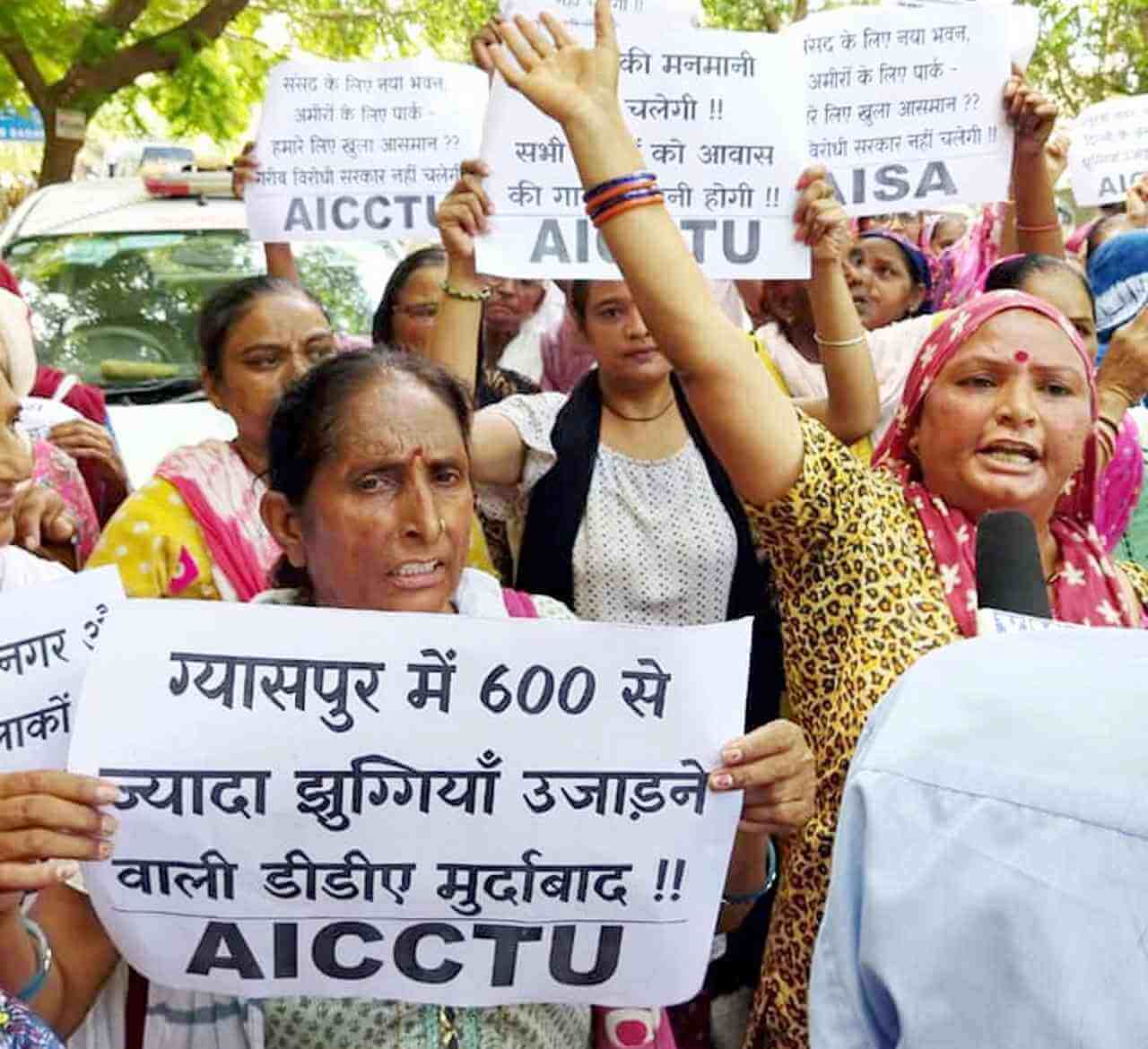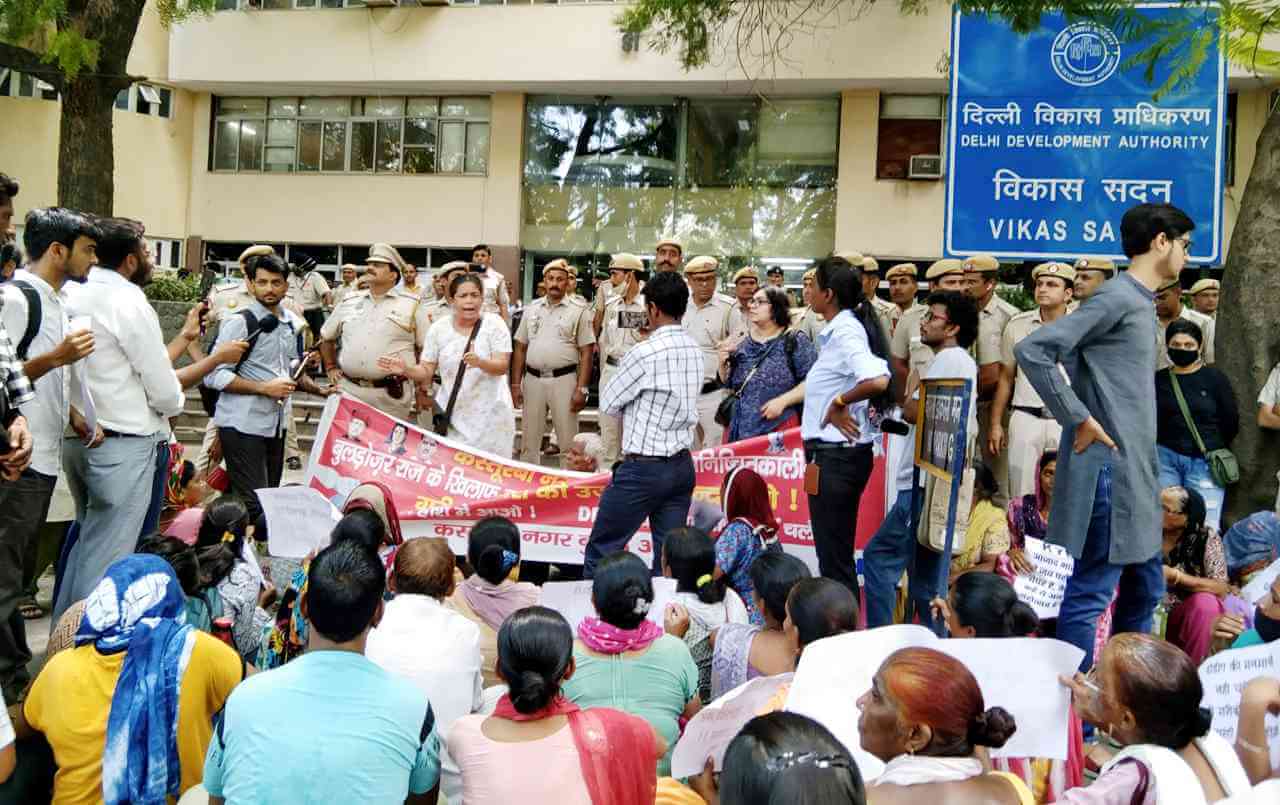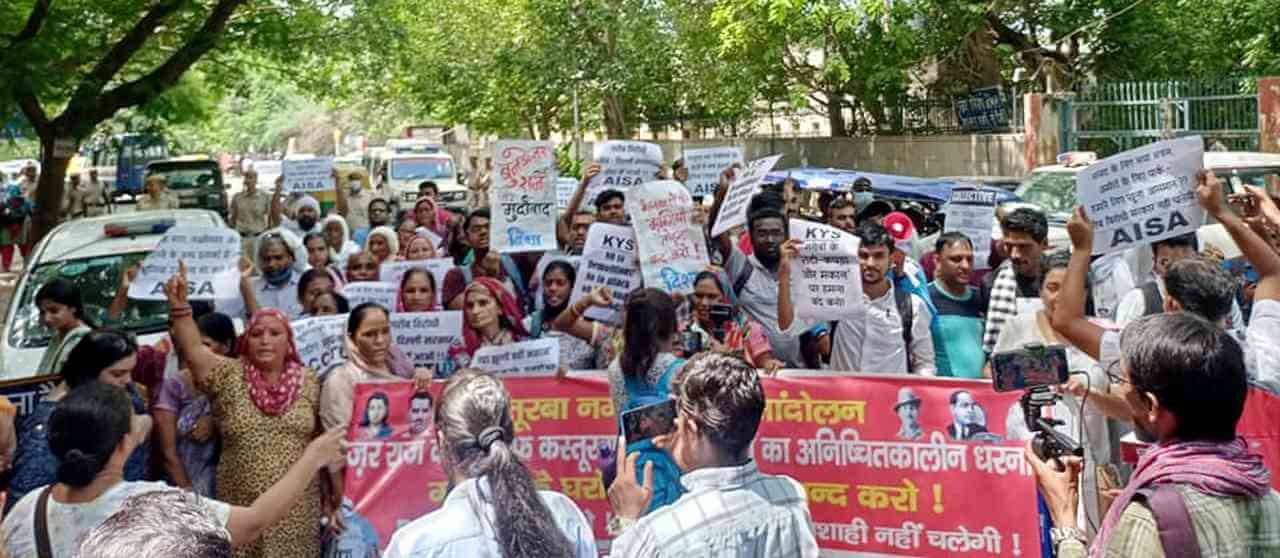Slum Demolitions in Delhi Continues

More than 600 families of the Gyaspur Slum in Delhi were forcibly displaced from their homes on 8th August, this time after serving them a two days’ notice by the Delhi Development Authority. Now when the country is celebrating 75th year of Independence thousands have been rendered homeless forced to live under open sky, without food, water, toilet and electricity. Similar notices of demolitions have also been sent to some other jhuggi clusters in the national capital. Earlier Dhobighat slum residents faced terror of the Bulldozers, and still they are continuously under threat of evictions. Why the government’s Bulldozers continue to rampage Delhi’s poor?
A Citizen's Protest was held in front of DDA HQ, Vikas Sadan, in Delhi on 10 Aug. with the demand of stopping evictions of poor and immediate rehabilitation of all evicted families. CPIML leader Sucheta De told that more than 1000 people including elders and new borns are under open sky without electricity, food and water as DDA demolished their houses in Gyaspur. They have been displaced because the land is needed for recreational park. How much anti poor can the governments be? The protest was joined by Jhuggi Adhikar Manch, Dhobighat Jhuggi Adhikar Manch, Kasturba Nagar Buland Awaz, AICCTU, AILAJ, AISA, BSCEM, Collective, DISHA, SFI and many eminent citizens.
Earlier a team of AICCTU-AISA-CPIML visited Gyaspur Area, a forty year old slum near Sarai Kale Khan, where more than 600 people belonging to families of daily wage labourers resided. They have been pushed into the streets or temporary shelters in the midst of the monsoon season.
Earlier in the year, after attempts by the Delhi Development Authority (DDA) to demolish the slums; and following protests by the slum-dwellers, workers’ unions and others, the Delhi High Court had issued a stay order on the demolitions on 28 June 2022. Unfortunately, the stay order has been vacated by Delhi High Court regarding Gyaspur.
CPIML has been standing in solidarity with the residents of Gyaspur Slum in their struggle against demolition and displacement. The slum-dwellers were asked to relocate themselves to “rain baseras” (temporary shelters) located as far away as Dwarka or across the river at Geeta Colony. The demolitions had been scheduled as soon as the judgement came out, giving the residents little time to organize themselves and file another legal appeal. Relocating to Dwarka or Geeta Colony will now also affect their already precarious livelihoods and education of their children.
DUSIB rules categorically state that any resident of a slum who has been staying in the area from before 2015 cannot be evicted without proper rehabilitation. The DDA has adopted the policy. Moreover, the Delhi High Court Judgement of Ajay Maken vs Union of India of 2019 states that no one can be evicted without first being provided with rehabilitation. It is up to the DUSIB and the central/state government to ensure in situ rehabilitation. if anyone is to be penalized in the current situation, it is the government for not fulfilling their task.
The right to housing is a major question in urban and semi-urban areas which are growing in numbers and population by the years. The question is significant enough for political parties like the Aam Aadmi Party to make election promises like “Jaha Jhuggi Waha Makan”. Yet those promises run hollow when it comes to implementation. The Union government of course has been running a bulldozer raj as part of its lopsided development policies and its veritable war on the poor and the working people.
Earlier evictions also took place in the name of environment protection, which was equally problematic. As was seen in Khori Gaon, private hotels are allowed to exist in ecologically sensitive zones whereas working class residences are demolished. Sucheta De said that in Gyaspur again, evictions to safeguard “lives and properties” forces every sane thinking citizen us to ask – whose lives and properties are we talking about? Why do the lives and properties of the slum dwellers not matter and why our environmental policies and their implementation are not pro-poor?
CPIML has demanded to immediately rehabilitate evicted people, halt Impending demolitions, and ensure In Situ rehabilitation of the slum dwellers.


Charu Bhawan, U-90, Shakarpur, Delhi 110092
Phone: +91-11-42785864 | +91 9717274961 E-mail: info@cpiml.org

